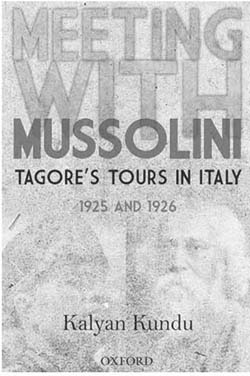Rabindranath Tagore’s visit to Italy in 1925, and especially the controversial tour of Italy in 1926 at the invitation of Benito Mussolini, has been a matter of interest to Tagore scholars for a long time. The acceptance of an invitation from a Fascist dictator by a great humanist baffled the international community of that time. The encounter also aroused a good deal of media interest both within and outside Italy.
A rich cache of materials—published in English, Italian, French and Bengali—are available on the subject. Rathindranth, Tagore’s son, maintained a diary of his father’s tours in Europe in 1925 and 1926, which was later published. Prasanta Chandra Mahalanobis, who was Tagore’s secretary on the 1926 tour, also published a full account of the visit. The authenticity of these accounts is substantiated by news reports that appeared in the British and Indian press and articles in several journals of that period, such as Prabasi and The Modern Review. In addition, there are a number of files in the Rabindra Bhavan Archives which contain Tagore’s correspondence with some Italian scholars and others including Mussolini. The most important among the Italian sources relating to Tagore’s visits to Italy are Gaetano Salvemini’s article on Tagore and Mussolini, Mario Prayer’s monograph on Bengali intellectuals and Italy in the nineteen twenties and thirties, and Carlo Formici’s comprehensive account of Tagore’s two Italian visits. The relevant sections of these have been translated into English. The French humanist Romain Rolland’s journal, dated 1915–43, contains accounts of the tours, obtained directly from the poet himself and his secretary Mahalanobis. A Bengali translation of the journal is available. Nirmal Kumari, the wife of Mahalanobis, was a member of the entourage of Tagore’s 1926 European tour. She has left behind a memoir in Bengali which describes in detail the events of that fateful encounter.
Based on the information derived from these sources, Tagore scholars have summed up his visit to Italy in 1926 in the following way. Tagore’s visit at the invitation of the Italian government was a heinous ploy by Mussolini. Following the assassination of two prominent socialist leaders, Amandola and Matteoti, in 1924, Mussolini’s international image was at an all-time low. Hence, he wanted to divert the world’s attention by inviting Tagore to Italy, expecting that Tagore would praise his Fascist government. He dispatched two professors, Carlo Formici and Giuseppe Tucci, to Santiniketan with a generous gift of books for Tagore’s university library to encourage and influence him to accept the Italian government’s invitation. Tagore, being unaware of Mussolini’s plan and being ignorant of Italian politics, accepted the invitation in good faith, as he had responded before to other governments’ invitations, and spent a fortnight in Italy as a guest of the Italian government. The Italian government gave an overwhelming reception to Tagore and his entourage. Tagore’s praise for Mussolini was reported in the Italian press with exuberance. As Tagore did not know the language, he did not realize that his speeches and interviews were distorted in favour of Mussolini and his regime. Scholars believe that all these may have been carefully manipulated by the two professors, especially Formici, to please their ‘master’. The European press was baffled to read the poet’s euphoric praise for Mussolini and his government.

